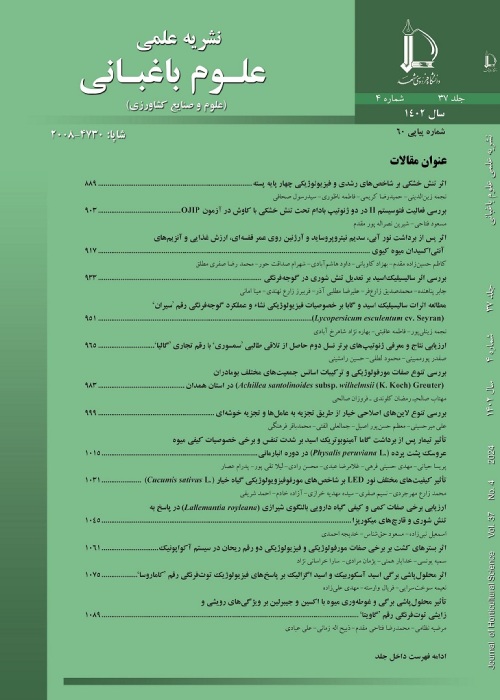The Effect of Salinity Stress on Tomato Root Characteristics (Saint Pierre) and its Yield under Irrigation Time Management
Nowadays, the decrease of water resources and increasing salinity of irrigation water are evident in most parts of Iran. Increased salinity of irrigation water can impair plant metabolism, decrease biomass and stem length. On the other hand, water stress decreases root length and weight and crop yield. One way to reduce the negative effects of moisture stress is management of irrigation time. This can be investigated by changing the percentage of moisture permitted depletion and selecting the one with the lowest yield depletion. On the other hand, the amount of damage to the crop can be reduced by examining different amounts of water salinity and its effect on crop yield. Therefore, in this study, the effects of different amounts of irrigation water salinity and irrigation time management on tomato yield under greenhouse conditions were investigated.
This study was carried out in greenhouse (No. 2) of Faculty of Agriculture and Natural Resources of University of Mohaghegh Ardabili. In this research, the effect of different values of salinity (in different irrigation times) on root characteristics and yield of tomato (Saint Pierre cultivar) was investigated. The experimental design used in this research was a factorial experiment in a completely randomized block design with four replications. The applied treatments included salinity of irrigation water (four levels: S1=1.5ds/m, S2=2.5ds/m, S3=4ds/m and S4=7ds/m) and irrigation time management stress (in three levels, irrigation at 40, 50 and 65% field capacity, respectively, I1, I2, I3). The pots used in this study were incomplete cones with a height of 27 cm, a span diameter of 26 cm and a bottom diameter of 19 cm. In this study, indirect method (transplanting) was used for cultivating tomato. After cultivating the transplants in prepared pots, they were irrigated with pure water for two months to stabilize the transplants in order to avoid any stress effect on the transplants. The moisture meter (Model: PMS-714) was also used to measure daily soil moisture of the pots. Statistical analysis was performed by MSTATC software. The important characteristics investigated in this study were root length, root weight (dry and wet), root diameter and volume, plant yield, water drainage, evapotranspiration and water use efficiency.
According to the results of this study, salinity values of irrigation water had a significant effect at 1% level on fresh and dry root weight, root diameter and volume, total evapotranspiration, total water use, total water drainage output, crop yield and the number of blooms. On the other hand, irrigation water salinity had no significant effect on the number of unripe fruits at 5% confidence level. For example, the highest fresh and dry weight of roots were 26.17 and 6.3 g for S2 treatment, respectively. However, the difference in root weight values for S2 and S1 treatments (Mean equal to 27.5%) was not significant. Also, with increasing salinity of irrigation water above 2.5 dS/m, root weight (dry and fresh) decreased significantly (at 1% level). The reason for the decrease in root weight at high level of salt concentrations can be due to the accumulation of salt (including potassium, sodium, etc.) in various organs of the plant including the root. On the other hand, the results showed that the effect of irrigation time management was significant only on root diameter and weight of ripe fruit at 5% and 1%, respectively. According to the results of this study, irrigation can be achieved with 50% moisture allowable depletion instead of 40% moisture permitted depletion without significant change in the weight of ripe tomato fruit. This can certainly cause saving of irrigation water that can be very effective in the current condition of Iran and lack of water resources. In this study, the relationship between evapotranspiration and crop yield and the relationship between these parameters, were investigated. Results showed that, tomato yield coefficient of response to moisture stress (Ky) varied from 0.4 to 1.20. Also the average response coefficient of tomato to water stress was 1.12. This value was close to the mean Ky provided by the FAO (Ky = 1.05). The slight increase in Ky value obtained from this study is probably due to the salinity stress applied to the tomato plant.
This study was conducted to investigate the effect of salinity stress on yield and root characteristics of tomato under irrigation time management and greenhouse conditions. The results showed that the effect of irrigation salinity was significant on yield, yield components and root characteristics (e.g., root weight, diameter and volume, yield, evapotranspiration and drainage output). On the other hand, moisture stress induced by irrigation time variation had no significant effect on yield, yield components and root characteristics of tomato except in two cases. This study indicated that the effect of salinity irrigation water is more effective than water stress on reduction yield. Also, according to the results of this study, the use of 2.5 dS/m irrigation water salinity instead of 1.5 dS/m in most cases had no significant effect on yield reduction but may also increase it. The results of this study show that under current conditions of Iran (increasing quantitative and qualitative shortage of water resources) it is possible to use lower quality waters such as treated wastewater and agricultural wastewater (with management of salinity and leaching) to achieve the acceptable yields for crops.
- حق عضویت دریافتی صرف حمایت از نشریات عضو و نگهداری، تکمیل و توسعه مگیران میشود.
- پرداخت حق اشتراک و دانلود مقالات اجازه بازنشر آن در سایر رسانههای چاپی و دیجیتال را به کاربر نمیدهد.


